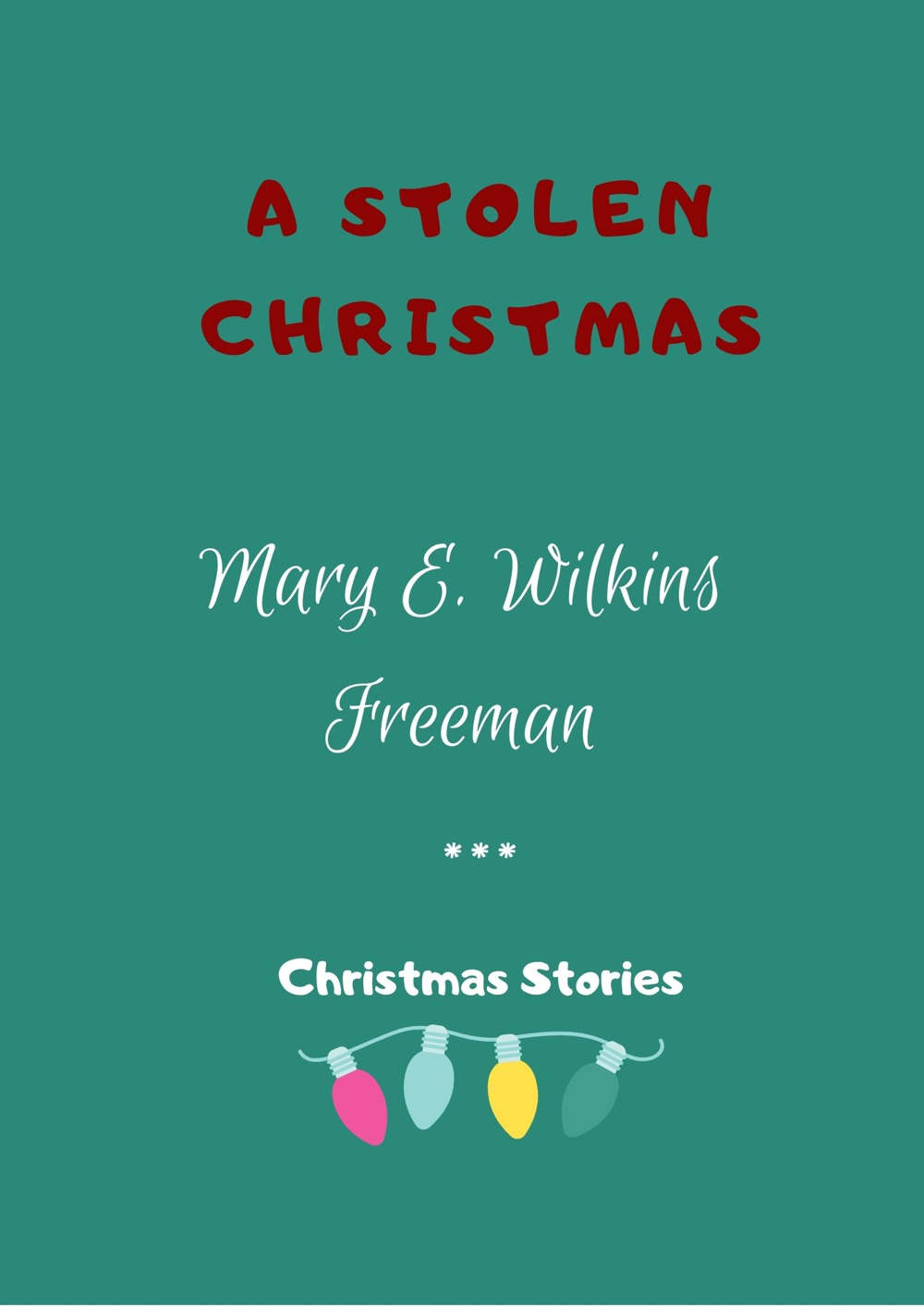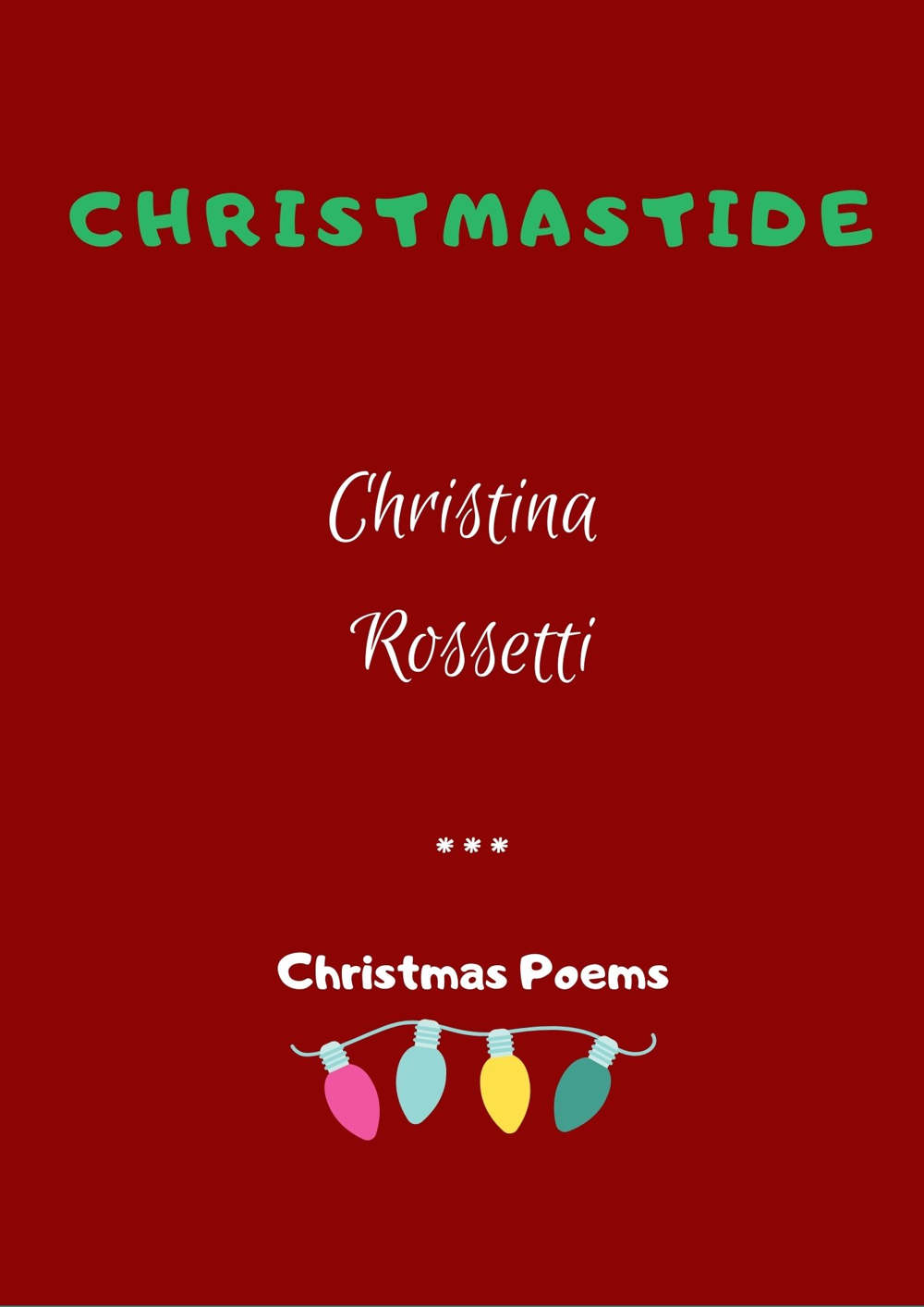
Recursos Educativos en Inglés - Stories in English
Cuentos clásicos en inglés para navidad
A Stolen Christmas by Mary E. Wilkins Freeman - Cuentos navidad
“I don't s'pose you air goin' to do much Christmas over to your house.”
Mrs. Luther Ely stood looking over her gate. There was a sweet, hypocritical smile on her little thin red mouth. Her old china blue eyes stared as innocently as a baby's, although there was a certain hardness in them. Her soft wrinkled cheeks were pink and white with the true blond tints of her youth, which she had never lost. She was now an old woman, but people still looked at her with admiring eyes, and probably would until she died. All her life long her morsel of the world had had in it a sweet savor of admiration, and she had smacked her little feminine lips over it greedily. She expected every one to contribute toward it, even this squat, shabby, defiant old body standing squarely out in the middle of the road. Marg'ret Poole had stopped unwillingly to exchange courtesies with Mrs. Luther Ely. She looked aggressive. She eyed with a sidewise glance the other woman's pink, smirking face.
“'Tain't likely we be,” she said, in a voice which age had made gruff instead of piping. Then she took a step forward.
“Well, we ain't goin' to do much,” continued Mrs. Ely, with an air of subdued loftiness. “We air jest goin' to hev a little Christmas tree for the children. Flora's goin' to git a few things. She says there's a very nice 'sortment up to White's.”
Marg'ret gave a kind of affirmative grunt; then she tried to move on, but Mrs. Ely would not let her.
“I dun know as you have noticed our new curtains,” said she.
Had she not! Poor Marg'ret Poole, who had only green paper shades in her own windows, had peeped slyly around the corner of one, and watched mournfully, though not enviously, her opposite neighbor tacking up those elegant Nottingham lace draperies, and finally tying them back with bows of red ribbon.
Marg'ret would have given much to have scouted scornfully the idea, but she was an honest old woman, if not a sweet one.
“Yes, I see 'em,” said she, shortly.
“Don't you think they're pretty?”
“Well 'nough,” replied Marg'ret, with another honest rigor.
“They cost consider'ble. I told Flora I thought she was kind of extravagant; but then Sam's airnin' pretty good wages. I dun know but they may jest as well have things. Them white cotton curtains looked dreadful kind of gone by.”
Marg'ret thought of her green paper ones. She did not hate this other old woman; she at once admired and despised her; and this admiration of one whom she despised made her angry with herself and ashamed. She was never at her ease with Mrs. Luther Ely.
Mrs. Ely had run out of her house on purpose to intercept her and impress her with her latest grandeur — the curtains and the Christmas tree. She was sure of it. Still she looked with fine appreciation at the other's delicate pinky face, her lace cap adorned with purple ribbons, her black gown with a flounce around the bottom. The gown was rusty, but Marg'ret did not notice that; her own was only a chocolate calico. Black wool of an afternoon was sumptuous to her. She thought how genteel she looked in it. Mrs. Ely still retained her slim, long-waisted effect. Marg'ret had lost every sign of youthful grace; she was solidly square and stout.
Mrs. Ely had run out, in her haste, without a shawl; indeed, the weather was almost warm enough to go without one. It was only a week before Christmas, but there was no snow, and the grass was quite bright in places. There were green lights over in the field, and also in the house yards. There was a soft dampness in the air, which brought spring to mind. It almost seemed as if one by listening intently might hear frogs or bluebirds.
Now Marg'ret stepped resolutely across the street to her little house, which was shingled, but not painted, except on the front. Some one had painted that red many years before.
Mrs. Ely, standing before her glossy white cottage, which had even a neat little hood over its front door, cried, patronizingly, after her once again:
“I'm comin' over to see you as soon as I kin,” said she, “arter Christmas. We air dretful busy now.”
“Well, come when ye kin,” Marg'ret responded, shortly. Then she entered between the dry lilac bushes, and shut the door with a bang.
Even out in the yard she had heard a shrill clamor of children's voices from the house; when she stood in the little entry it was deafening.
“Them children is raisin' Cain,” muttered she. Then she threw open the door of the room where they were. There were three of them in a little group near the window. Their round yellow heads bobbed, their fat little legs and arms swung wildly. “Granny! granny!” shouted they.
“For the land sake, don't make such a racket! Mis' Ely kin hear you over to her house,” said Marg'ret.
“Untie us. Ain't ye goin' to untie us now? Say, Granny.”
“I'll untie ye jest as soon as I kin get my things off. Stop hollerin'.”
In the ceiling were fixed three stout hooks. A strong rope was tied around each child's waist, and the two ends fastened securely around a hook. The ropes were long enough to allow the children free range of the room, but they kept them just short of one dangerous point — the stove. The stove was the fiery dragon which haunted Marg'ret's life. Many a night did she dream that one of these little cotton petticoats had whisked too near it, and the flames were roaring up around a little yellow head. Many a day, when away from home, the same dreadful pictures had loomed out before her eyes; her lively fancy had untied these stout knots, and she had hurried home in a panic.
Marg'ret took off her hood and shawl, hung them carefully in the entry, and dragged a wooden chair under a hook. She was a short woman, and she had to stretch up on her tiptoes to untie those hard knots. Her face turned a purplish-red.
This method of restriction was the result of long thought and study on her part. She had tried many others, which had proved ineffectual. Willy, the eldest, could master knots like a sailor. Many a time the grandmother had returned to find the house empty. Willy had unfastened his own knot and liberated his little sisters, and then all three had made the most of their freedom. But even Willy, with his sharp five-year-old brain and his nimble little fingers, could not untie a knot whose two ends brushed the ceiling. Now Marg'ret was sure to find them all where she left them.
After the children were set at liberty she got their supper, arranging it neatly on the table between the windows. There was a nice white table cover, and the six silver teaspoons shone. The teaspoons were the mark of a flood-tide of Marg'ret's aspirations, and she had had aspirations all her life. She had given them to her daughter, the children's mother, on her marriage. She herself had never owned a bit of silver, but she determined to present her daughter with some.
“I'm goin' to have you have things like other folks,” she had said.
Now the daughter was dead, and she had the spoons. She regarded the daily use of them as an almost sinful luxury, but she brought them out in their heavy glass tumbler every meal.
“I'm goin' to have them children learn to eat off silver spoons,” she said, defiantly, to their father; “they'll think more of themselves.”
The father, Joseph Snow, was trying to earn a living in the city, a hundred miles distant. He was himself very young, and had not hitherto displayed much business capacity, although he was good and willing. They had been very poor before his wife died; ever since he had not been able to do much more than feed and clothe himself. He had sent a few dollars to Marg'ret from time to time — dollars which he had saved and scrimped pitifully to accumulate — but the burden of their support had come upon her.
She had sewed carpets and assisted in spring cleanings — everything to which she could turn a hand. Marg'ret was a tailoress, but she could now get no employment at her trade. The boys all wore “store clothes” in these days. She could only pick up a few cents at a time; still she managed to keep the children in comfort, with a roof over their heads and something to eat. Their cheeks were fat and pink; they were noisy and happy, and also pretty.
After the children were in bed that night she stood in her kitchen window and gazed across at Mrs. Luther Ely's house. She had left the candle in the children's room — the little things were afraid without it — and she had not yet lighted one for herself; so she could see out quite plainly, although the night was dark. There was a light in the parlor of the opposite house; the Nottingham lace curtains showed finely their pattern of leaves and flowers. Marg'ret eyed them. “'Tain't no use my tryin' to git up a notch,” she muttered. “'Tain't no use for some folks. They 'ain't worked no harder than I have; Louisa Ely 'ain't never begun to work so hard; but they kin have lace curtains an' Christmas trees.”
The words sounded envious. Still she was hardly that; subsequent events proved it. Her “tryin' to git up a notch” explained everything. Mrs. Luther Ely, the lace curtains, and the Christmas tree were as three stars set on that higher “notch” which she wished to gain. If the other woman had dressed in silk instead of rusty wool, if the lace draperies had been real, Marg'ret would hardly have wasted one wistful glance on them. But Mrs. Luther Ely had been all her life the one notch higher, which had seemed almost attainable. In that opposite house there was only one carpet; Marg'ret might have hoped for one carpet. Mrs. Ely's son-in-law earned only a comfortable living for his family; Marg'ret's might have done that. Worst of all, each woman had one daughter, and Marg'ret's had died.
Marg'ret had been ambitious all her life. She had made struggle after struggle. The tailoress trade was one of them. She made up her mind that she would have things like other people. Then she married, and her husband spent her money. One failure came after another. She slipped back again and again on the step to that higher notch. And here she was to-night, old and poor, with these three helpless children dependent upon her.
But she felt something besides disappointed ambition as she stood gazing out to-night.
“Thar's the children,” she went on; “can't have nothin' for Christmas. I 'ain't got a cent I kin spare. If I git 'em enough to eat, I'm lucky.”
Presently she turned away and lighted a lamp. She had some sewing to do for the children, and was just sitting down with it, when she paused suddenly and stood reflecting.
“I've got a good mind to go down to White's an' see what he's got in for Christmas,” said she. “Mebbe Joseph 'll send some money 'long next week, an' if he does, mebbe I kin git 'em some little thing. It would be a good plan for me to kind of price 'em.”
Marg'ret laid her work down, got her hood and shawl, and went out, fastening the house securely, and also the door of the room where the stove was.
To her eyes the village store which she presently entered was a very emporium of beauty and richness. She stared at the festoons of evergreens, the dangling trumpets and drums, the counters heaped with cheap toys, with awe and longing. She asked respectfully the price of this and that, some things less pretentious than the others. But it was all beyond her. She might as well have priced diamonds and bronzes. As she stood looking, sniffing in the odor of evergreen and new varnish, which was to her a very perfume of Christmas arising from its fulness of peace and merriment, Flora Trask, Mrs. Ely's daughter, entered. Marg'ret went out quickly. “She'll see I ain't buyin' anything,” she thought to herself.
But Marg'ret Poole came again the next day, and the next, and the next — morning, afternoon, and evening. “I dun know but I may want to buy some things by-an'-by,” she told the proprietor, extenuatingly, “an' I thought I'd kind of like to price 'em.”
She stood about, eying, questioning, and fingering tenderly. No money-letter came from Joseph. She inquired anxiously at the post-office many times a day. She tried to get work to raise a little extra money, but she could get none at this time of the year. She visited Mrs. White, the store-keeper's wife, and asked with forlorn hope if she had no tailor-work for her. There were four boys in that family. But Mrs. White shook her head. She was a good woman. “I'm sorry,” said she, “but I haven't got a mite. The boys wouldn't wear home-made clothes.”
She looked pitifully at Marg'ret's set, disappointed face when she went out.
Finally those animals of sugar and wood, those pink-faced, straight-bodied dolls, those tin trumpets and express wagons, were to Marg'ret as the fair apples hanging over the garden wall were to Christiana's sons in the Pilgrim's Progress. She gazed and gazed, until at last the sight and the smell of them were too much for her.
The evening before Christmas she went up to the post-office. The last mail was in, and there was no letter for her. Then she kept on to the store. It was rather early, and there were not as yet many customers. Marg'ret began looking about as usual. She might have been in the store ten minutes when she suddenly noticed a parcel on the corner of a counter. It was nicely tied. It belonged evidently either to one of the persons who were then trading in the store or was to be delivered outside later. Mr. White was not in; two of his sons and a boy clerk were waiting upon the customers.
Marg'ret, once attracted by this parcel, could not take her eyes from it long. She pored over the other wares with many sidelong glances at it. Her thoughts centred upon it, and her imagination. What could be in it? To whom could it belong?
Marg'ret Poole had always been an honest woman. She had never taken a thing which did not belong to her in her whole life. She suddenly experienced a complete moral revulsion. It was as if her principles, where weights were made shifty by her long watching and longing, had suddenly gyrated in a wild somersault. While they were reversed, Marg'ret, warily glancing around, slipped that parcel under her arm, opened the door, and sped home.
It was better Christmas weather than it had been a week ago. There was now a fine level of snow, and the air was clear and cold. Marg'ret panted as she walked. The snow creaked under her feet. She met many people hurrying along in chattering groups. She wondered if they could see the parcel under her shawl. It was quite a large one.
When she got into her own house she hastened to strike a light. Then she untied the parcel. There were in it some pink sugar cats and birds, two tin horses and a little wagon, a cheap doll, and some bright picture-books, besides a paper of candy.
“My land!” said Marg'ret, “won't they be tickled!”
There was a violent nervous shivering all over her stout frame. “Why can't I keep still?” said she.
She got out three of the children's stockings, filled them, and hung them up beside the chimney. Then she drew a chair before the stove, and went over to the bureau to get her Bible: she always read a chapter before she went to bed. Marg'ret was not a church member, she never said anything about it, but she had a persistent, reticent sort of religion. She took up the Bible; then laid it down; then she took it up again with a clutch.
“I don't keer,” said she, “I 'ain't done nothin' so terrible out of the way. What can't be airned, when anybody's willin' to work, ought to be took. I'm goin' to wait till arter Christmas; then I'm jest goin' up to Mis' White's some arternoon, an' I'm goin' to say, ‘Mis' White,’ says I, ‘the day before Christmas I went into your husband's store, an' I see a bundle a-layin' on the counter, an' I took it, an' said nothin' to nobody. I shouldn't ha' done such a thing if you'd give me work, the way I asked you to, instead of goin' outside an' buyin' things for your boys, an' robbin' honest folks of the chance to airn. Now, Mis' White, I'll tell you jest what I'm willin' to do: you give me somethin' to do, an' I'll work out twice the price of them things I took, an' we'll call it even. If you don't, all is, your husband will have to lose it.’ I wonder what she'll say to that.”
Marg'ret said all this with her head thrown back, in a tone of indescribable defiance. Then she sat down with her Bible and read a chapter.
The next day she watched the children's delight over their presents with a sort of grim pleasure.
She charged them to say nothing about them, although there was little need of it. Marg'ret had few visitors, and the children were never allowed to run into the neighbors'.
Two days after Christmas the postmaster stopped at Marg'ret's house: his own was just beyond.
He handed a letter to her. “This came Christmas morning,” said he. “I thought I'd bring it along on my way home. I knew you hadn't been in for two or three days, and I thought you were expecting a letter.”
“Thank ye,” said Marg'ret. She pulled the letter open, and saw there was some money in it. She turned very white.
“Hope you 'ain't got any bad news,” said the postmaster.
“No, I 'ain't.” After he had gone she sat down and read her letter with her knees shaking.
Joseph Snow had at last got a good situation. He was earning fifty dollars a month. There were twenty dollars in the letter. He promised to send her that sum regularly every month.
“Five dollars a week!” gasped Marg'ret. “My land! An' I've — stole!”
She sat there looking at the money in her lap. It was quite late; the children had been in bed a long time. Finally she put away the money, and went herself. She did not read in her Bible that night.
She could not go to sleep. It was bitterly cold. The old timbers of the house cracked. Now and then there was a sharp report like a pistol. There was a pond near by, and great crashes came from that. Marg'ret might have been, from the noise, in the midst of a cannonade, to which her own guilt had exposed her.
“'Tain't nothin' but the frost,” she kept saying to herself.
About three o'clock she saw a red glow on the wall opposite the window.
“I'm 'maginin' it,” muttered she. She would not turn over to look at the window. Finally she did. Then she sprang, and rushed toward it. The house where Mrs. Luther Ely lived was on fire.
Marg'ret threw a quilt over her head, unbolted her front door, and flew. “Fire! fire!” she yelled. “Fire! fire! Oh, Mis' Ely, where be you? Fire! fire! Sam — Sam Trask, you're all burnin' up! Flora! Oh! fire! fire!”
By the time she got out in the road she saw black groups moving in the distance. Hoarse shouts followed her cries. Then the church bell clanged out.
Flora was standing in the road, holding on to her children. They were all crying. “Oh, Mis' Poole!” sobbed she, “ain't it dreadful? ain't it awful?”
“Have you got the children all out?” asked Marg'ret.
“Yes; Sam told me to stand here with 'em.”
“Where's your mother?”
“I don't know. She's safe. She waked up first.” The young woman rolled her wild eyes toward the burning house. “There she is!” cried she.
Mrs. Ely was running out of the front door with a box in her hand. Her son-in-law staggered after her with a table on his shoulder.
“Don't you go in again, mother,” said he.
There were other men helping to carry out the goods, and they chimed in. “No,” cried they; “'tain't safe. Don't you go in again, Mis' Ely!”
Marg'ret ran up to her. “Them curtains,” gasped she, “an' the parlor carpet, have they got them out?”
“Oh, I dun know — I dun know! I'm afraid they 'ain't. Oh, they 'ain't got nothin' out! Everything all burnin' up! Oh, dear me! oh dear! Where be you goin'?”
Marg'ret had rushed past her into the house. She was going into the parlor, when a man caught hold of her. “Where are you going?” he shouted. “Clear out of this.”
“I'm a-goin' to git out them lace curtains an' the carpet.”
“It ain't any use. We staid in there just as long as we could, trying to get the carpet up; but we couldn't stand it any longer; it's chock full of smoke.” The man shouted it out, and pulled her along with him at the same time. “There!” said he, when they were out in the road; “look at that.” There was a flicker of golden fire in one of the parlor windows. Then those lace curtains blazed. “There!” said the man again: “I told you it wasn't any use.”
Marg'ret turned on him. There were many other men within hearing. “Well, I wouldn't tell of it,” said she, in a loud voice. “If I was a pack of stout, able-bodied men, and couldn't ha' got out them curtains an' that carpet afore they burnt up, I wouldn't tell of it.”
Flora and the children had been taken into one of the neighboring houses. Mrs. Ely still stood out in the freezing air clutching her box and wailing. Her son-in-law was trying hard to persuade her to go into the house where her daughter was.
Marg'ret joined them. “I would go if I was you, Mis' Ely,” said she.
“No, I ain't goin'. I don't care where I be. I'll stay right here in the road. Oh, dear me!”
“Don't take on so.”
“I 'ain't got a thing left but jest my best cap here. I did git that out. Oh dear! oh dear! everything's burnt up but jest this cap. It's all I've got left. I'll jest put it on an' set right down here in the road an' freeze to death. Nobody 'll care. Oh dear! dear! dear!”
“Oh, don't, Mis' Ely.” Marg'ret, almost rigid herself with the cold, put her hand on the other woman's arm. Just then the roof of the burning house fell in. There was a shrill wail from the spectators.
“Do come, mother,” Sam begged, when they stood staring for a moment.
“Yes, do go, Mis' Ely,” said Marg'ret. “You mustn't feel so.”
“It's easy 'nough to talk,” said Mrs. Ely. “'Tain't your house; an' if 'twas, you wouldn't had much to lose — nothin' but a passel of old wooden cheers an' tables.”
“I know it,” said Marg'ret.
Finally Mrs. Ely was started, and Marg'ret hurried home. She thought suddenly of the children and the money. But the children had not waked in all the tumult, and the money was where she had left it. She did not go to bed again, but sat over the kitchen stove thinking, with her elbows on her knees, until morning. When morning came she had laid out one plan of action.
That afternoon she took some of her money, went up to Mr. White's store, and bought some Nottingham lace curtains like the ones her neighbors had lost. They were off the same piece.
That evening she went to call on Mrs. Ely, and presented them. She had tried to think that she might send the parcel anonymously — leave it on the door-step; but she could not.
“'Twon't mortify me so much as 'twill the other way,” said she, “an' I'd ought to be mortified.”
So she carried the curtains, and met with a semblance of gratitude and a reality of amazement and incredulity which shamed her beyond measure.
After she got home that night she took up the Bible, then laid it down. “Here I've been talkin' and worryin' about gettin' up a higher notch,” said she, “an' kind of despisin' Mis' Ely when I see her on one. Mis' Ely wouldn't have stole. I ain't nothin' 'side of her now, an' I never kin be.”
The scheme which Marg'ret had laid to confront Mrs. White was never carried out. Her defiant spirit had failed her.
One day she went there and begged for work again. “I'm willin' to do 'most anything,” said she. “I'll come an' do your washin', or anything, an' I don't want no pay.”
Mrs. White was going away the next day, and she had no work to give the old woman; but she offered her some fuel and some money.
Marg'ret looked at her scornfully. “I've got money enough, thank ye,” said she. “My son sends me five dollars a week.”
The other woman stared at her with amazement. She told her husband that night that she believed Marg'ret Poole was getting a little unsettled. She did not know what to make of her.
Not long after that Marg'ret went into Mr. White's store, and slyly laid some money on the counter. She knew it to be enough to cover the cost of the articles she had stolen. Then she went away and left it there.
That night she went after her Bible. “I declare I will read it to-night,” muttered she. “I've paid fur 'em.” She stood eying it. Suddenly she began to cry. “Oh dear!” she groaned; “I can't. There don't anything do any good — the lace curtains, nor payin' fur 'em, nor nothin'. I dun know what I shell do.”
She looked at the clock. It was about nine. “He won't be gone yet,” said she. She stood motionless, thinking. “If I'm goin' to-night, I've got to,” she muttered. Still she did not start for a while longer. When she did, there was no more hesitation. No argument could have stopped Marg'ret Poole, in her old hood and shawl, pushing up the road, fairly started on her line of duty. When she got to the store she went in directly. The heavy door slammed to, and the glass panels clattered. Mr. White was alone in the store. He was packing up some goods preparatory to closing. Marg'ret went straight up to him, and laid a package before him on the counter.
“I brought these things back,” said she; “they belong to you.”
“Why, what is it?” said Mr. White, wonderingly.
“Some things I stole last Christmas for the children.”
“What!”
“I stole 'em.”
She untied the parcel, and began taking out the things one by one. “They're all here but the candy,” said she; “the children ate that up; an' Aggie bit the head off this pink cat the other day. Then they've jammed this little horse consider'ble. But I brought 'em all back.”
Mr. White was an elderly, kind-faced man. He seemed slowly paling with amazement as he stared at her and the articles she was displaying.
“You say you stole them?” said he.
“Yes; I stole 'em.”
“When?”
“The night afore Christmas.”
“Didn't Henry give 'em to you?”
“No.”
“Why, I told him to,” said Mr. White, slowly. “I did the things up for you myself that afternoon. I'd seen you looking kind of wishful, you know, and I thought I'd make you a present of them. I left the bundle on the counter when I went to supper, and told Henry to tell you to take it, and I supposed he did.”
Marg'ret stood staring. Her mouth was open, her hands were clinched. “I dun know — what you mean,” she gasped out at length.
“I mean you 'ain't been stealing as much as you thought you had,” said Mr. White. “You just took your own bundle.”
🔆 Christmas Stories 🎅🤶🎄
Adblock test (Why?)






